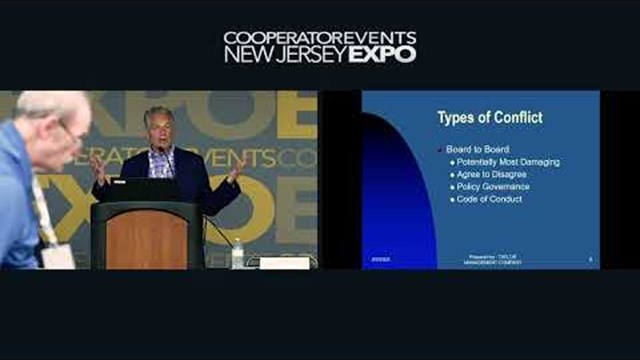
I Love Lucy is one of the most beloved sitcoms in all of television history. In one episode, after Little Ricky is born, the baby is screaming and screaming, keeping awake the next door tenant, Mrs. Trumbull. Mrs. Trumbull complains to landlord Fred Mertz, demanding that he do something about it. According to Mrs. Trumbull, the building rules state that babies aren't allowed. Okay, it's a rental building...and it's a sitcom, so of course everything turns out all right by the end of the 30 minutes. Mrs. Trumbull even ends up loving Little Ricky and becoming his babysitter.
Wouldn't it be great if all problems in a building were handled so smoothly and succinctly? If at the settling of a disagreement, everyone became friends and lived happily ever after? Sure it would— but it would also involve some wishful thinking. The reality is that in co-op and condo living, problems are bound to arise between residents—as well as between the residents and the board—and unless these issues are handled deftly, they can easily balloon into something even more divisive and unpleasant.
Well, That Escalated Quickly
So what are the main culprits for conflicts between parties? In short, “Residents breaking rules and regulations, residents causing damage and quality of life issues,” says James Cervelli, a portfolio manager at Cervelli Management Corporation in North Bergen. Parking issues, noise complaints, pet problems and rental restrictions, specifically, top the list.
According to Simeon H. Baum, an attorney and a member of The National Academy of Distinguished Neutrals and president of Resolve Mediation Services, Inc., which does business in the tri-state area, a board's financial decisions can also lead to potential problems between the board and the residents—up to and including litigation.
"These decisions can lead to increased maintenance fees or assessments," says Baum. "Even issues of board composition and succession can generate disagreement, particularly in buildings where there is a fracture in the community over one of these typical issues, and there is a fracture within the board or split between the existing board and a group that would challenge the board. These can result in contested elections."
Baum says that the most typical lawsuits involving co-ops or condos are property damage cases. "The upstairs neighbor's pipe bursts, flooding neighbors below. Boards can also be hauled into court for discrimination claims. Similarly, boards can be sued for claims of discrimination against, or failure to accommodate, persons with disabilities,” he says.
It's no secret that lawsuits are expensive, acrimonious undertakings that can severely erode both the finances and morale of building communities. When a disagreement between a resident and the board escalates into a serious dispute and the threat of litigation is brought into the mix, it can make a bad situation worse. And perhaps the most irksome thing about these types of issues is that to a large degree, they're preventable. Time and again, attorneys and managers cite board inaction or opacity as the reason why resident grievances ignite into litigation.
Alternatives
Regardless of the problem, there are other alternatives for resolving any of these conflicts without resorting to the courts. These range from an informal sit-down between disputing parties to more formal (and legally binding) arrangements reached with the help of a professional mediator. Collectively, these measures are referred to as alternative dispute resolution, or ADR, which can help cut through the red tape and legalese that are part and parcel of a full-blown lawsuit to solve the problems between two or more parties.
In fact, parties involved in housing-related disputes in the Garden State are required to participate in ADR, as per the New Jersey Condominium Act and the Planned Real Estate Development Full Disclosure Act. The Condominium Act states that “An association shall provide a fair and efficient procedure for the resolution of housing-related disputes between individual unit owners and the association, and between unit owners, which shall be readily available as an alternative to litigation."
Further, “A person other than an officer of the association, a member of the governing board or a unit owner involved in the dispute shall be made available to resolve the dispute. A unit owner may notify the Commissioner of Community Affairs if an association does not comply with this subsection. The commissioner shall have the power to order the association to provide a fair and efficient procedure for the resolution of disputes.” Similarly, the Planned Real Estate Development Full Disclosure Act (PREDFDA), N.J.S.A. 45:22A-44(c), provides that “[The] association shall provide a fair and efficient procedure of the resolution of disputes between individual unit owners, which shall be readily available as an alternative to litigation.”
“I think [ADR] can be a cost effective approach that may tend to give more of an equal way to appease parties, as opposed to going to court and actually having a judge decide one way or the other without any compromise,” says Angela Morisco, an attorney at Becker & Poliakoff's Morristown office. “I think it's a good way if everyone is willing to participate and take it seriously, not just as a precursor to litigation.”
Baum explains that mediation and arbitration are two of the three major alternatives to litigation. "The most significant alternative, which is the often-overlooked granddaddy of dispute resolution processes, is negotiation," he says. "We negotiate all the time. The real question is how effective can we be, and how effective our representatives are in negotiation. When negotiations hit a snag, there might be a number of things negotiators, or the principals responsible for the negotiation, might do to get past the impasse. But, assuming negotiations have ground to a halt, the use of a neutral third party to help resolve the dispute might be in order.”
Baum says that in mediation, the parties themselves are the decision-makers. "The mediator is a neutral party who helps the parties engage in constructive communication, reflection, bargaining, and joint decision making," he explains. "The mediator helps the parties identify their own interests, learn about the interests of the other parties, and brainstorm together to generate options that might aim to maximize satisfaction of all parties' interests."
The major difference between mediation and arbitration, Baum continues, is the identity of the decision maker. "Arbitration is similar to litigation, in that a neutral third party makes an evaluation and determination that is binding on the parties," he says. "In litigation, a judge and jury make the binding decision. In arbitration, the arbitrator is judge and jury rolled up into one. While there might be appeals from the decision of the trial court, there is no general right of appeal from arbitration. Arbitral awards may be modified or vacated only on very narrow ground, like fraud on the tribunal, or bias of the arbitrators. Mistake of law or fact is not a ground for vacating an arbitrator's award. The courts give great reference to arbitral awards as creatures of contract—processes agreed to by the parties in a written contract in advance of the dispute or agreed on an ad-hoc basis after the dispute has arisen.”
“Arbitration is a very relaxed atmosphere,” Morisco adds. “The rules of evidence generally don’t apply, and you can tend to get oral testimony and documentary evidence in that you may not be able to at a trial.”
The Process
Mediation is not legally binding, and the way it is performed varies on a case-by-case basis, tailored to the conflicting parties' dynamics. The mediation process starts as both parties and their counsel ask around and interview mediators to learn about their orientation, experience and style. The mediation session itself is a confidential meeting. This enables parties to speak freely without concern that statements made in an effort to resolve their dispute will be used against them as admissions against interest in court, in the unlikely event that the mediation does not produce a resolution.
"Once selected, it is good practice for mediators to hold a conference call with the parties—or more typically, with their counsel—to learn about the matter going into mediation," says Baum. "We confirm that all parties will appear at the mediation with full authority to make a deal. I suggest that counsel or the parties prepare me with a premediation statement bringing me up to speed on the facts of the dispute; the law, to the extent it will influence or be a part of the discussion; what might be important to the parties; their thoughts on resolution; insights into inter-party dynamics; thoughts for the process itself; and any other information that might be useful. It is also a good time to learn whether the parties need information from each other in advance of their mediation session, and to lay out a process for developing and sharing that information."
The mediation session itself is a confidential meeting. This enables parties to speak freely without concern that statements made in an effort to resolve their dispute will be used against them as admissions in court, in the unlikely event that the mediation does not produce a resolution.
Baum explains that the opening session begins with the mediator's introduction to the process, followed by opening statements by parties or their representatives generally expressing their views of the issues that have brought them to the table and what they would like to see come out of the day. "It is fairly common, however, for the parties to break for separate, confidential meetings with the mediator, known as caucuses," he says. "These offer an opportunity for the parties to reflect on what is important to them, to share confidential information with the mediator, to receive candid feedback, and the like."
When a decision is made in mediation, it is not binding, however, involved parties can sign an agreement of the resolution terms established in the session.
The American Arbitration Association (AAA) estimates that ADR is able to settle disputes in about 80 percent of cases—saving not only time, but legal fees. While ADR isn't free (counseling attorneys may still charge fees, and mediators typically are paid as well) both parties shoulder the cost of the process, which can be tens of thousands of dollars less than full-blown litigation and court costs.
Every year, millions of dollars are spent on the cost of litigation. Even what seems like a simple court case can cost the parties thousands, if not tens of thousands, of dollars. ADR also helps to reduce potential out-of-pocket costs.
These methods are a lot quicker and less costly than a full trial, but are still rather pricey.
The number of people involved, prep time and the actual length of time it takes to mediate are all factors that weigh into the final cost of mediation. Mediation can cost upwards of $6,000, on average, the pros say. Go the arbitration route and expect those figures to double.
Affordable ADR
Luckily, there are other low or no-cost options for mediation.
The New Jersey chapter of the Community Associations Institute (CAI-NJ) offers an ADR program. Residents of an association that has a covenants committee can turn to them for dispute assistance. A covenants committee, which should consist of three non-board members selected by the board, will “act as an alternative dispute resolution vehicle with respect to filed written complaints of rules violations and other 'housing related disputes,' according to “New Jersey Condominium and Association Law: A Practical Guide to Condominium & Other Common Interest Communities” by attorneys Wendell A Smith, Dennis A. Estis and Christine F. Li of the Woodbridge-based law firm of Greenbaum Rowe Smith & Davis, LLP.
While the establishment of a covenants committee is not mandatory, it is highly recommended.
If an association has a very patient and hands-on manager willing to mediate a meeting, costs of hiring outside parties can be avoided. Mediation services through CAI-NJ costs $375 for the first two hours, and $150 each additional hour for members; and $500 for the first two hours and $150 additionally for non-members.
Keith Hales, president a Midwestern property management firm, has had his fair share of experience playing mediator. After successfully quelling a conflict between an owner and the board caused by a leasing restriction (the board wanted to enforce a rental restriction rule), he practically perfected the art of navigating a fiery, conflict-based meeting.
“Come up with the agenda and talking points of the meeting and limit discussions to that,” he says. “Put a time limit on it. In this particular example I acted as the mediator. Whoever the mediator is should talk to the experts and come up with a plan on how the meeting should go first. If you bring people and just say, 'Yeah, let's just discuss this,' it becomes very unproductive. Come in and hear both sides of the argument. I reached out to the most vocal people and asked them for their sticking points and added it to the meeting agenda,” Hales suggests.
“Bringing in factual information and experts in the industry has helped me,” he adds. What I found is that you actually bring in someone who is an expert in the industry—either the legal side of it or the actual mortgage side, such as a loan officer. In this particular case, we brought in an attorney. The attorney is a neutral party who just came in to discuss the facts. I didn't bring a loan officer in but I had a lot of information about why adding more renters to a building it actually affects mortgage rates for people and also affects their FHA approval, and in turn affects the overall value when someone wants to sell.”
Perhaps we can learn something from Lucy after all.
Lisa Iannucci is a freelance writer and a frequent contributor to The New Jersey Cooperator. Editorial Assistant Enjolie Esteve contributed to this article.






Leave a Comment